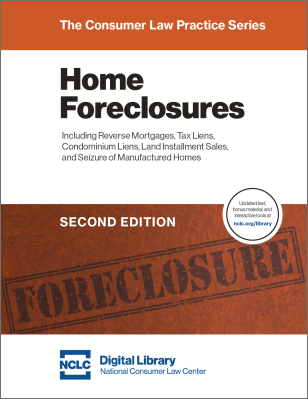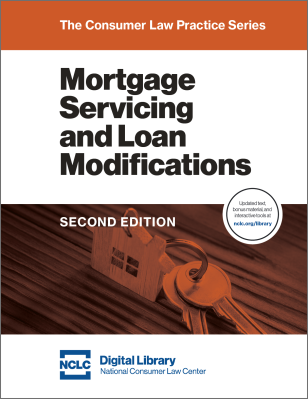New requirements, interpretations and issues have been raised in 2015 as to federal mortgage servicing requirements. These are all covered in the updated online version of Chapter 3 of NCLC’s Foreclosures and Mortgage Servicing (5th ed. 2014). Click on highlight updates to see the new changes added since the print edition:
Section 3.2.2: this new section addresses the question of whether RESPA applies to a co-owner of property who signs the mortgage or deed of trust as part of a mortgage loan transaction, but does not sign the promissory note. It also discusses the application of RESPA to a successor of the borrower, in the successor’s capacity as representative of the original borrower’s estate.
Section 3.2.2.10 updates decisions on the CFPB regulations dealing with Notices of Error and Requests for Information.
Section 3.2.2.10.5 for Notices of Error sent after January 10, 2014, it is no longer sufficient for the servicer to merely conduct some investigation, the servicer’s investigation must be reasonable. Several recent decisions address what it means to conduct an “investigation” and whether the investigation is “reasonable.”
Section 3.2.2.10.6 for Requests for Information sent after January 10, 2014, a servicer may not conduct simply an “investigation” for the requested information, it must to conduct a “a reasonable search for the requested information.” A recent decision finds that this amendment to Regulation X reflects a substantive change in the response requirement imposed on servicers.
Section 3.2.8 discusses the first decisions applying the CFPB’s loss mitigation regulation. Rejecting frivolous arguments about the enforceability of the regulation, several decisions find that RESPA’s private right of action is available to remedy violations of the loss mitigation procedures.
Section 3.2.10.4 Before the CFPB’s servicing regulations took effect, federal courts often held that because RESPA does not expressly provide for injunctive relief or other equitable remedies, they could not enjoin or set aside a foreclosure sale or provide other injunctive relief based on violations of RESPA. These decisions ignored clear Supreme Court precedent on the inherent power of federal courts to issue injunctive and declaratory relief. These decisions also have not considered the foreclosure avoidance amendments to RESPA and Regulation X made by the Dodd-Frank Act and the CFPB’s 2013 Mortgage Servicing Rule. We provide in this new section strong arguments that advocates can use to support a claim for injunctive relief for violations of the loss mitigation procedures and other RESPA requirements.



